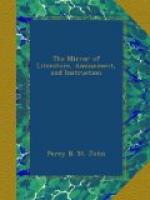There is in all this, as Mr. Wordsworth remarks, something so extraordinary, as to make some explanatory details necessary. These we shall give in his own words. “And to begin,” says he, “with his industry; eight hours in each day, during five days in the week, and half of Saturday, except when the labours of husbandry were urgent, he was occupied in teaching. His seat was within the rails of the altar; the communion table was his desk; and, like Shenstone’s schoolmistress, the master employed himself at the spinning-wheel, while the children were repeating their lessons by his side. Every evening, after school hours, if not more profitably engaged, he continued the same kind of labour, exchanging, for the benefit of exercise, the small wheel, at which he had sate, for the large one on which wool is spun, the spinner stepping to and fro. Thus was the wheel constantly in readiness to prevent the waste of a moment’s time. Nor was his industry with the pen, when occasion called for it, less eager. Entrusted with extensive management of public and private affairs, he acted in his rustic neighbourhood as scrivener, writing out petitions, deeds of conveyance, wills, covenants, &c., with pecuniary gain to himself, and to the great benefit of his employers. These labours, at all times considerable, at one period of the year, viz., between Christmas and Candlemas, when money transactions are settled in this part of the country, were often so intense, that he passed great part of the night, and sometimes whole nights, at his desk. His garden, also, was tilled by his own hand; he had a right of pasturage upon the mountains for a few sheep and a couple of cows, which required his attendance; with this pastoral occupation he joined the labours of husbandry upon a small scale, renting two or three acres in addition to his own, less than one acre of glebe; and the humblest drudgery which the cultivation




